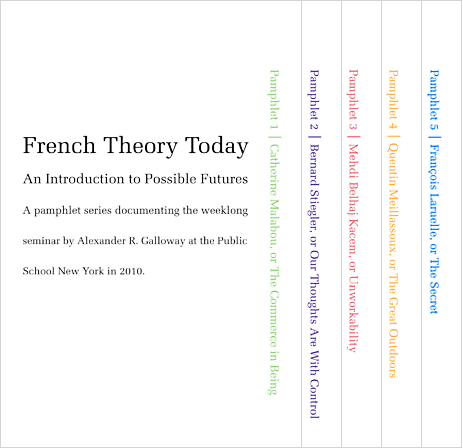Alexander Galloway: French Theory Today: An Introduction to Possible Futures (2011)
Filed under pamphlet | Tags: · non-philosophy, philosophy, theory

“This set of five pamphlets documents a seminar given recently by Alexander R. Galloway at the Public School New York, a self-organizing educational program where class ideas are generated by the public. French Theory Today explores a new generation of French voices—Catherine Malabou, Bernard Stiegler, Mehdi Belhaj Kacem, Quentin Meillassoux, and François Laruelle—whose work has, to varying degrees, only recently emerged in the English-speaking world. Each night of the seminar consisted of a lecture followed by questions from and discussion with class participants. As Galloway suggests in the online class proposal, the goal was ‘not to set in aspic a new canon for French philosophy, but to proceed inductively, tracing some recent experiments and possible futures.'”
Pamphlet 1 | Catherine Malabou, or The Commerce in Being
Pamphlet 2 | Bernard Stiegler, or Our Thoughts are With Control
Pamphlet 3 | Mehdi Belhaj Kacem, or Unworkability
Pamphlet 4 | Quentin Meillassoux, or The Great Outdoors
Pamphlet 5 | François Laruelle, or The Secret
Each pamphlet includes the texts of the lectures, plus transcriptions of the Q&A, as well as special responses and contributions from Nicola Masciandaro, Eugene Thacker, Dominic Pettman, Jackson Moore, Stephen Squibb, Prudence Whittlesey, Taeyoon Choi, and David Horvitz.
Publisher The Public School New York/Erudio Editions, 2011
PDF, PDF (updated on 2021-12-16)
Comment (0)Journal of Digital Humanities 1:1 (2012)
Filed under journal | Tags: · code, digital humanities, software, theory, writing
The Journal of Digital Humanities is a comprehensive, peer-reviewed, open access journal that features the best scholarship, tools, and conversations produced by the digital humanities community in the previous quarter.
The journal offers expanded coverage of the digital humanities by publishing scholarly work beyond the traditional research article, selecting content from open and public discussions in the field, and by encouraging continued discussion through peer-to-peer review.
Contributions by Tim Hitchcock, Trevor Owens, Scott Weingart, Chad Black, Marc Downie and Paul Kaiser, Jeremy Boggs, Alison Booth, Daniel J. Cohen, Mitchell S. Green, Anne Houston, and Stephen Ramsay, Nik Honeysett and Michael Edson, Fred Gibbs, Natalia Cecire, Benjamin M. Schmidt, William G. Thomas, Jean Bauer, Patrick Murray-John, Elijah Meeks, Tom Scheinfeldt and Ryan Shaw, Mark Sample, Alexis Lothian, Peter Bradley, Tim Sherratt, Moya Z. Bailey, Amy Earhart, Boone B. Gorges, Jeremy Boggs, David McClure, Eric Rochester, and Wayne Graham
Vol. 1, No. 1, Winter 2011
Editors: Daniel J. Cohen, Joan Fragaszy Troyano
Associate Editors: Sasha Hoffman, Jeri Wieringa
Publisher Roy Rosenzweig Center for History and New Media, April 2012
ISSN 2165-6673
more information (digitalhumanitiesnow.org)
View online (HTML articles)
PDF (PDF)
PDF (EPUB)
PDF (IBOOK)
Stephan Fuchs: Against Essentialism: A Theory of Culture and Society (2001)
Filed under book | Tags: · avant-garde, communication, constructivism, culture, essentialism, ethnomethodology, hermeneutics, networks, social theory, society, sociology, systems theory, theory

Against Essentialism presents a sociological theory of culture. This interdisciplinary and foundational work deals with basic issues common to current debates in social theory, including society, culture, meaning, truth, and communication. Stephan Fuchs argues that many mysteries about these concepts lose their mysteriousness when dynamic variations are introduced.
Fuchs proposes a theory of culture and society that merges two core traditions–American network theory and European (Luhmannian) systems theory. His book distinguishes four major types of social “observers”–encounters, groups, organizations, and networks. Society takes place in these four modes of association. Each generates levels of observation linked with each other into a “culture”–the unity of these observations.
Against Essentialism presents a groundbreaking new approach to the construction of society, culture, and personhood. The book invites both social scientists and philosophers to see what happens when essentialism is abandoned.
Publisher Harvard University Press, 2001
ISBN 0674006100, 9780674006102
380 pages

